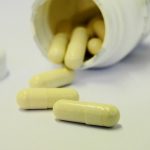
The benefits of hops have long been recognised for centuries. As a plant you may have seen it trailing and snaking over telegraph wires or rambling through orchards and hedgerows. Nowadays the hop vine is an important ingredient, not just in beverages but also in consumer healthcare products for aiding better sleep. It also makes a great home decoration.
Hops,(Latin name: Humulus Iupulus) were used in herbal medicine long before their use in fermented barley drinks that we know as beer. The Germans added hops to beer in about the 9th Century AD and by the 14th Century, when brewers had learned of hop’s preservative powers, most of Europe was doing it, replacing other herbs such as marjoram and yarrow (Achillea species) and flavour enhancers. Some, including Henry VIII, felt the herb was dangerous to add to beer so he made it illegal and it wasn’t until 1552 that it was welcomed back.
Components In Hops
The bitter agents are the main reasons why hops have powerful flavouring properties. These are mainly prenylated phloroglucinol derivatives known as alfa-acids or humulones (2-12% of the dried strobile), principally isohumulone (35-70%), and beta-acids or lupulones (1-10% of dried strobile), principally lupulone (30-55%). (Verzele, 1986).
The essential oil (0.5-1.5%) consists mainly of myrcene (monoterpene) and beta-caryophyllene, humulene and farnesene (sesquiterpenes).
Hops contain a sedative chemical called 2-methly-3-buten-2-ol, which is more concentrated in dried, older hops

Uses
- When hop production increased for beer brewing, harvesters noticed that they tired easily and the women’s periods came on early, which gave hops a reputation as a sedative and as an aid to menstruation. There is however very little data to support the efficacy of hops as a sleep aid but the sedative effect comes from animal studies.
- The dried, whole female flowers (inflorescences) known as strobile are used in herbal preparations.
- Hops may be used to relax the digestive tract
Preparation
To enjoy as an infusion, steep two teaspoons of hops in hot water for up to five minutes. To help get to sleep use older dried hops but for digestive use, its believed that fresh hops are more effective.
Sedating Effects Of Hops
For many centuries, hops were used to treat insomnia and other sleep conditions like restlessness. Some of the compounds found in hops are also used as sedatives. Later on it was shown that the alpha acids in hops acted as antidepressants in rats.
Compounds In Hops May Also Help Reduce The Effects Of Metabolic Syndrome
Scientists at the Oregon State University showed that compounds in hops could help with reducing the impact of metabolic syndrome. This is a debilitating condition involving high blood pressure (hypertension), high blood sugar if not diabetes, excess fat around the waist, high cholesterol and blood fats (triglycerides), fatty liver, generally poor metabolism etc. The main consequences are heart disease and generally diabetes. The benefits of these hop compounds could be far-reaching given that nearly a third of US citizens for example have to live with metabolic syndrome according to research from the Mayo Clinic.
The research had previously shown that xanthohumol (XN) which is one of the hop flavours and a couple of derivatives including β‐dihydro‐XN (DXN) and tetrahydro‐XN (TXN) ameliorated the effects of metabolic syndrome. The researchers thought that the improvements were related to better gut health, better bile acid metabolism, reduction in inflammation and perhaps improvements in intestinal barrier function.
The research involved a mouse model. The mice were fed either a high-fat diet on its own or the same diet with containing all three of the hop compounds. They looked at the effect of the various compounds on various conditions such as tissue inflammation; gut microbiome composition; and bile aid, which helps with the digestion of fat.
All three compounds reduced the diversity and abundance of the gut microflora, as well reducing inflammation and altering bile acid metabolism. Perhaps most significantly, there was a reduction in secondary bile acid production and an increase of conjugated bile acids, which indicated better energy metabolism, glucose metabolism, and cholesterol metabolism.
The lead researcher, Adrian Gombart, a professor of biochemistry and biophysics in the Oregon State University College of Science, is quoted from his press release saying:-
“Changes in gut microbiota and bile acid metabolism seem to explain at least partially why XN and its derivatives lead to improvements in obesity and other aspects of metabolic syndrome.”
The results do not show cause and effect but he thought there was something interesting happening to the microbiota and further research was needed to find out which ones were responding to the hop compounds. Hop compounds have always been known for their antimicrobial effects so which bacteria and yeasts are being killed off and which ones are living on would be worth knowing.
Cautionary Information
- Do not give to any child under two years old
- Do not use while pregnant or nursing
- For over 65s, use low levels, infrequently
Products
[Please note we are an affiliate marketing partner and will make a sales commission if you purchase any items through our affiliate links. Please read our affiliate disclosure]
References
Verzele M. (1986) Centenary review: 100 years of hop chemistry and its relevance to brewing. J. Inst. Brew. 92 pp. 32-48
Zhang, Y., Bobe, G., Revel, J. S., Rodrigues, R. R., Sharpton, T. J., Fantacone, M. L., … & Morgun, A. (2020). Improvements in Metabolic Syndrome by Xanthohumol Derivatives are Linked to Altered Gut Microbiota and Bile Acid Metabolism. Molecular Nutrition & Food Research, 64(1), 1900789 (Article).
Revision: Addition of research on ameliorating metabolic syndrome (23rd January 2020).



Leave a Reply